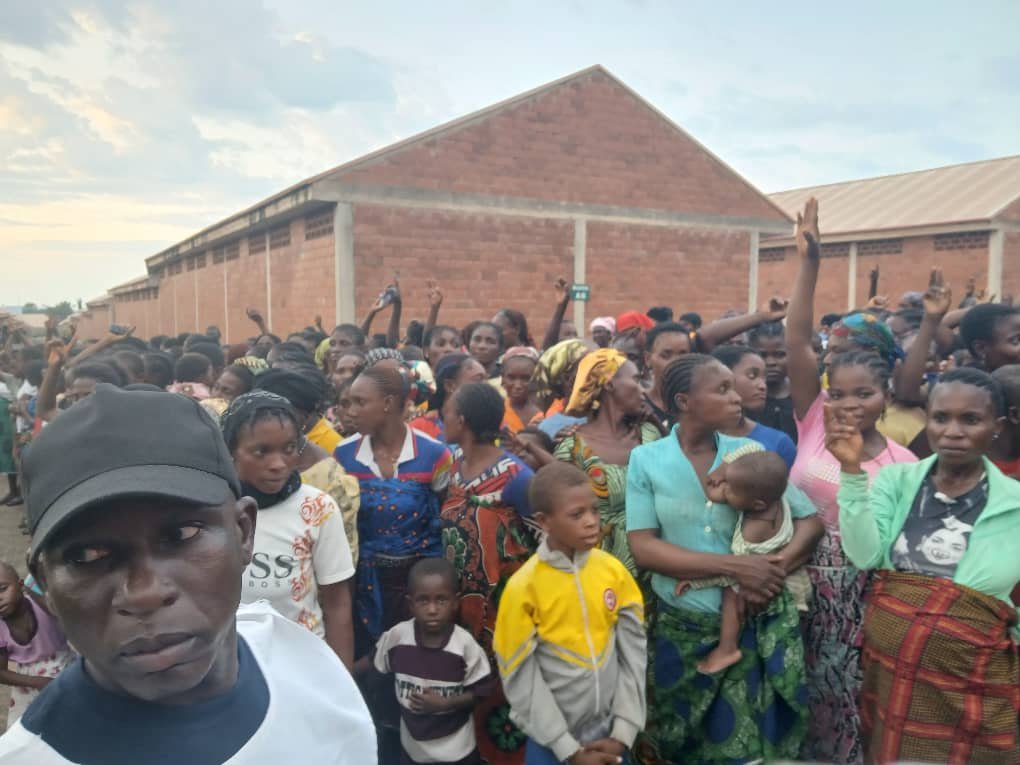A NIGHT OF TERROR
In the still darkness of night, gunshots shattered the silence in Yelewata and Daudu, two agrarian communities in Guma Local Government Area of Benue State, Nigeria. It was around 11 p.m. when the first attackers struck—armed herdsmen in their numbers, arriving from both the eastern and western flanks. By dawn, over 6, 500 (According to a data released by the National Emergency Management Agency, NEMA) people—mostly women, children, and internally displaced persons (IDPs)—lay dead. NEMA stated categorically that 657 children under 18 are being affected – displaced. The horror went on as entire families were incinerated in market stalls where they had sought refuge.
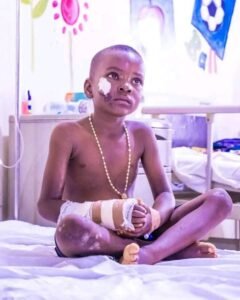
“They came prepared. They surrounded us,” recalled Matthew Mnyan, a community leader and former acting chairman of the Benue State Universal Basic Education Board (SUBEB), holding back tears. “Children were burnt alive. We had families of 12, 15… all wiped out. Some were reduced to ashes.”
In this special report, Juliet Jacob who recounted the gruesome killings, pays a special attention to the plight and future of the wounded and displaced children.
“THEY CAME IN THEIR THOUSANDS”
Dr. Priscilla Achakpa, environmentalist and founder of the Women Environmental Programme, reacting in the aftermath of the attack:
“It was a well-planned massacre. The victims were mostly women, children, mothers, and the elderly. But it’s the children we should think about most. Their lives have been irreversibly broken.”
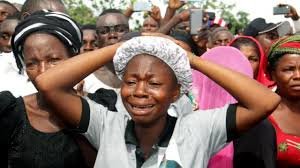
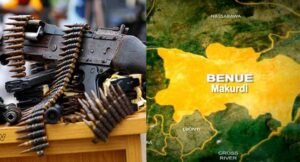
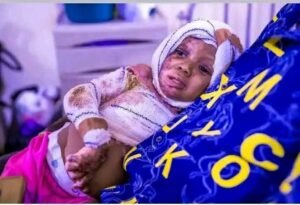
The assailants, believed to be Fulani herdsmen, invaded under the cover of darkness. In Yelewata market, IDPs from sacked communities had taken shelter in wooden stalls, believing proximity to a local police station and military checkpoint would offer some safety.
“They poured petrol on the stalls,” Mnyan explained, “and set everything ablaze. Innocent toddlers were slaughtered like animals.”
A HUMANITARIAN CRISIS DEEPENS
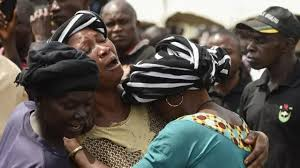
Benue has become the epicenter of Nigeria’s deadly herder-farmer crisis—a conflict driven by environmental degradation, land disputes, and ethnic-religious fault lines. According to data obtained by Africa Health Report, over 1,043 people were killed in Benue between May 2023 and May 2025 alone. A separate report by Amnesty International said that 2,600 people have died and 135 attacks occurred across 50 communities between January 2023 and February 2024, with most victims being women and children.
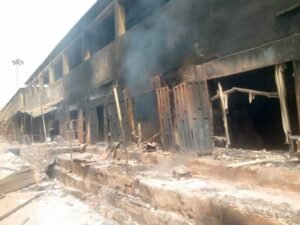
Eighteen of Benue’s twenty-three LGAs are now directly affected by violence. Insecurity has displaced over 489,000 people, destroyed 55 schools, razed 23 markets, and forced 80% of farmers in Agatu, Guma, and Gwer West off their land—crippling local food production.
“It is heart breaking,” said Chief Dennis Gbongbon, President of the Association of United Farmers Benue Valley. “Even having run from sacked homes into IDP camps, terror still follows them.”
FAITH’S STORY: CHILDHOOD STOLEN
At the Ortese IDP Camp in Guma, 12-year-old Faith Veor sits silently outside a UNICEF-sponsored tent. Her eyes are dull. Her brother was killed during the same attack that drove them from their home. Her mother, though physically present, has not spoken in weeks.
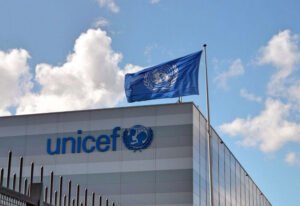
Faith’s story is a snapshot of what many Benue children endure.
“Children like Faith aren’t just displaced—they’re traumatized,” said Dr.Olamide Lekan, a humanitarian analyst who spoke with Africa Health Report. “They’re cut off from education, parental guidance, nutrition, and mental health support. Some are too anxious to sleep. Others are haunted by flashbacks.”
Faith is among over 16,500 IDPs in Ortese camp, where UNICEF, Médecins Sans Frontières (MSF), and WHO have provided temporary medical facilities, clean water, and psychosocial care.
Still, protection remains fragile. A camp volunteer confided:
“Girls here sleep in shifts. Fear of rape or renewed attacks is constant. Every loud sound sends them into panic.”
“THIS IS A CRIME AGAINST HUMANITY”
Former UN Special Rapporteur on Human Trafficking, Prof. Joy Ngozi Ezeilo, did not mince words:
“What is happening in Benue is a grave crime against humanity. These mass killings must not go unpunished. We cannot normalize the murder of children.”
Despite previous security deployments, including a joint military task force in 2018 and Forest Guards introduced in 2025, communities remain vulnerable.
“We keep hearing of new task forces and presidential directives,” said Sam Philip, a public affairs analyst in Makurdi. “But the killings continue. How many more children must die before we act?”
THE CHILDREN LEFT BEHIND
According to Dr. Lekan, the impact of this sustained violence on children is multilayered:
Mental Health: Many suffer from anxiety, depression, and post-traumatic stress disorder (PTSD).
Developmental Delay: Prolonged exposure to violence and malnutrition is causing cognitive and physical stunting.
Educational Loss: With schools destroyed, and no digital access, learning has stopped for tens of thousands.
“Some of these kids haven’t stepped into a classroom in three years,” said Lekan. “A generation is being raised in trauma.”
The World Health Organization (WHO) warns that psychological damage in conflict zones—especially for children—can last decades. Without adequate care, displaced children risk becoming lost adults.
A SYSTEMIC FAILURE
Environmental pressures like desertification in the North, driven by climate change, continue to push herders south. In Benue, where ethno-religious identity and land access intersect, violence has escalated.
“It’s not just conflict—it’s conquest,” Mnyan said. “They want to take over our land, and they’re doing it through blood.”
“Benue doesn’t get national attention like Boko Haram,” Sam Philip added. “That silence is killing us.”
WHAT MUST BE DONE
Dr. Lekan called for urgent, coordinated, and child-focused interventions:
Security: Deploy permanent, intelligence-led security units to rural communities.
Education: Rebuild schools and provide mobile learning for displaced children.
Mental Health: Scale up trauma therapy and create safe spaces in all IDP camps.
Foster Systems: Explore foster home models for orphans, similar to global best practices.
Livelihood Alternatives: Provide herders with options outside of violent grazing routes.
“We cannot treat this as a temporary crisis anymore,” he warned. “It’s structural, and it requires deep reform.”
A NATION AT A CROSSROADS
Benue’s children are not statistics. They are the walking wounded of a nation that has failed them repeatedly. Behind every death toll is a schoolbag left behind, a lullaby interrupted, a future incinerated.
“We owe these children more than pity,” said Isa Sanusi, Director of Amnesty International Nigeria. “We owe them justice, safety, and hope.”
FINAL WORD
As Nigeria battles food inflation nearing 40% and national inflation hitting 33.95% as of May 2025, the cost of conflict in Benue extends far beyond death. It is eroding the foundation of the nation’s future—its children.
The world must not look away.
“If we fail Benue’s children now, we fail Nigeria tomorrow.” – Africa Health Report

